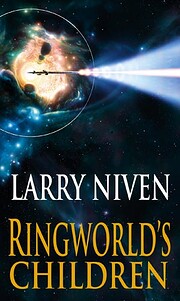

Click on a thumbnail to go to Google Books.
|
Loading... Ringworld's Children (edition 2007)by Larry Niven (Author)
Work InformationRingworld's Children by Larry Niven (Author)
 None No current Talk conversations about this book. I'm changing my mind about this one. I had only remembered it somewhat fondly, but after rereading it, I've got to bump it up because of how satisfying it was. Not only good writing, but it was full of great story, great characters, and the fulfillment of a fear that had followed all of the ringworld books. Well, one of many. I'm referring to poor Louis. I was thrilled and awed and rooting for him the entire way. I wasn't even slightly surprised at the very end, either. It's great to have godlike tech when surrounded by godlike tech. :) When someone thinks about big, they should always think about what Niven has accomplished. Sure, Stephen Baxter has gotten it right, too, but I still think of Niven as king. Big, Big, Big! A lot of people laugh, but it sparks the imagination and makes a reader keep thinking and questioning, and that's one of the biggest and best functions of great sci-fi. :) no reviews | add a review
The Ringworld is a landmark engineering achievement, a flat band three million times the surface of the Earth, encircling a distant star. Home to trillions of inhabitants, not all of whom are human, and host to amazing technological wonders, the Ringworld is unique in all of the universe. Explorer Louis Wu, an Earth-born human who was part of the first expedition to Ringworld, becomes enmeshed in interplanetary and interspecies intrigue as war, and a powerful new weapon, threaten to tear the Ringworld apart forever. Now the future of Ringworld lies in its children: Tunesmith, the Ghould protector; Acolyte, the exiled son of Speaker-to-Animals, and Wembleth, a strange Ringworld native with a mysterious past. All must play a dangerous game in order to save Ringworld's population, and the stability of Ringworld itself. Blending awe-inspiring science with nonstop action, Ringworld's Children. No library descriptions found. |
Current DiscussionsNonePopular covers
 Google Books — Loading... Google Books — Loading...GenresMelvil Decimal System (DDC)813.54Literature American literature in English American fiction in English 1900-1999 1945-1999LC ClassificationRatingAverage: (3.41) (3.41)
Is this you?Become a LibraryThing Author. |
||||||||||||||||||||||||||||||||||||||||||||||||||||||||||||||||||||||||||||||||||||||||||||||||||||||||||||||||||||||||||||||||||||||
This one finds him in surprisingly lively mood; he sets about administering various shocks to the system, and finding solutions to the problems that arise, which is clearly what he enjoys doing.
By now, the inhabitants of the Ringworld have to contend not only with their own problems and the problems of the Ringworld itself, but also with the military fleets of various civilizations that have found the Ringworld and see it as a source of valuable information. They’re sparring with each other and causing further damage and danger to the Ringworld and its inhabitants.
The situation is a mess to be sorted out by the protector Tunesmith (who came in with the third volume), with some help from Louis Wu and his surviving companions.
It makes a readable and competent sequel. I doubt that Niven’s going to win more awards now, but anyone who liked the previous books can confidently buy this one.
My main criticism is that there’s only one human female in the book, and I don’t like her. Niven has always tended to write about men; he throws in the odd woman from time to time but they don’t tend to be very memorable. In the original Ringworld book there was Teela Brown, but she was never much of a character and she died in the second volume.
The title of this book comes about, I suppose, because some of the original explorers who discovered the Ringworld back in the first volume now have children (born on the Ringworld) who are taking part in the story. Though, in fact, they don’t have a big contribution to make to it.
The first sentence of the book is, “Louis Wu woke aflame with new life, under a coffin lid.” This is because, at the end of the third volume, he was put into a one-of-a-kind experimental autodoc, which uses nanotechnology to rebuild him cell by cell. Thanks to the use of boosterspice, he was already 243 years old, but injured. Now the experimental autodoc has rebuilt him as a young adult in perfect health.
An autodoc is a machine into which you climb; it then automatically performs whatever surgery and other doctoring it thinks you need. Who would trust such a machine, especially an experimental one? Well, probably anyone who’s seriously injured or seriously old. In fact, the crimes some people would commit in order to get into it hardly bear thinking about.
Louis Wu is not only lucky enough to pass through the machine once. At the end of this book, having been seriously injured again, he passes through it again, to emerge just as perfect as he was at the start. Perhaps someday, after I’m dead, such machines will be available and people will take them for granted. Alas! Why was I born in primitive times?
(Review written in 2009) (